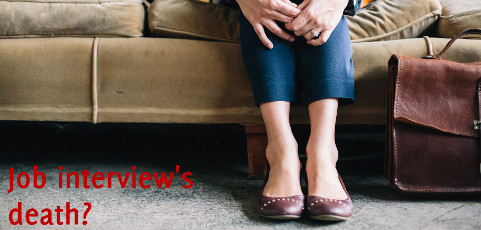In my life I sat through some hundreds of job interviews. Most of the times as an interviewer in different companies: IBM, Anixter and Galactica. In some cases I was on the other chair.
What do most of them have in common? Quite useless in pinning down if I liked the job or the candidate was the right one for the job.
I chose Anixter, amongst the others, because Marco looked like the boss I wanted to work with and Elena brought me a coffee. I chose Galactica because after several years Marco wasn’t any more the one I wanted to work with, and Lorenzo was (plus there were no dumb corporate policies)
I didn’t offer a job to Laura, she was great but insisted in seeing herself as a painting restorer, instead I hired Corrado because…. well, I didn’t know precisely why (and eventually figured out it was a good decision).
Some people are great in job interviews. Some of them turn out to be the worst you could put in the job, unless you sell “job-interviews” of course 🙂
In general we tend to hire people for two macro-kind of positions, let’s call them labourer and creative. The former asks for people who are good in performing a given task and follow clear directions (shipping a package, taking a blood sample o manage a spreadsheet). The latter is where you expect someone to help shape the job, bring a contribute in moving towards a goal where not every step is a predetermined process. It could be a manager, a craftsman or an inside sales.
If you are to interview a candidate for a labourer job I wonder if all the classical job-interview questions are really useful.
Even more interesting is when we get to the creative. More often than not the pre-backed interview offered no value in unveiling if the candidate was the right one. I also have to take notice than in half an hour it is quite difficult to give the candidate a good enough picture of the job at stake. If I think back at my interviews (where I got the job), at how the position was described to me, and how it really was…. Quite a difference indeed.
So what could I have done differently?
Before when I was interviewing for an inside sales position we had three interviews totalling around three hours of time. Roughly half of it to present the job and the other half to probe the candidate. Today if I were to do it again I’d go for a different approach. Half an hour to tour the office, how the company works, the sales department, what we do day in day out, accounts, warehouse, working tools and the training available. Another half an hour sitting with inside sales to see REALLY how’s the job. Hear them on the phone, see them entering orders, discuss projects with Marco, ask Barbara for an NSP or check a delivery with Fabrizio…. Real life.
Then for most of the rest of the time give him a phone, a prospect, and an achievable task (something where you don’t need specific knowledge). Call a lapsed customer, profile a prospect, get someone enrol for an event. Sitting next to the candidate to help her/him and support her/him when needed. Most of all to see how she/he works. At the end, the last half an hour to hear her/his take on what she/he has seen and lived through during the interview.
It would be a great challenge, and change for me, but I strongly believe in it. People change after you interview them, always. I mean that the one you work with is different from the picture you get out of a job interview. Do you think this discrepancy would be bigger if the interview was abstract or closer to the real job?
(this post was inspired long ago by one from the amazing Seth :http://sethgodin.typepad.com/seths_blog/2006/09/the_end_of_the_.html)


Recent Comments